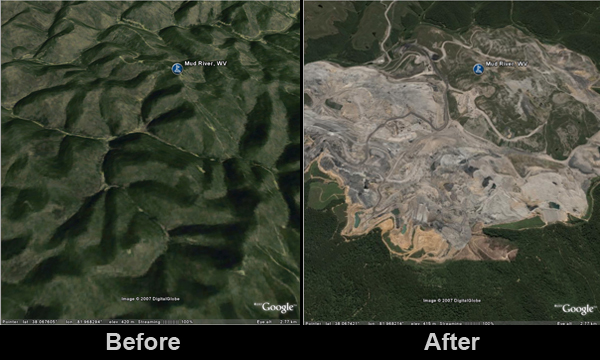 Sure the WashPost mocked Sen. James Inhofe (R-OIL) as “the last flat-earther.” But that was a purely metaphorical description of the pro-pollution right-winger. Turns out U.S. Senate candidate Rand Paul’s (R-KY) actually thinks a lot of Kentucky would be “quite desirable” if it were literally flattened by big coal.
Sure the WashPost mocked Sen. James Inhofe (R-OIL) as “the last flat-earther.” But that was a purely metaphorical description of the pro-pollution right-winger. Turns out U.S. Senate candidate Rand Paul’s (R-KY) actually thinks a lot of Kentucky would be “quite desirable” if it were literally flattened by big coal.
The scientific reality is quite different — see Science bombshell explodes myth of clean coal: Mountaintop “mining permits are being issued despite the preponderance of scientific evidence that impacts are pervasive and irreversible and that mitigation cannot compensate for losses.”
TP has the amazing video and story of a candidate who is an apologist for the biggest of polluters:
One of the themes of U.S. Senate candidate Rand Paul’s (R-KY) campaign has been that businesses are burdened with overregulation, with Paul even decrying the anti-discrimination provisions imposed on private businesses in the Civil Rights Act.
Now, Crooks and Liars has unearthed an interview Rand Paul gave in 2009 where the candidate aired these strident views with respect to mountaintop removal. When asked about the environmentally disastrous process, Paul told the interviewer that he thinks “whoever owns the property can do with the property as they wish, and if the coal company buys it from a private property owner and they want to do it, fine.” To justify his hands-off approach to environmental regulation, Paul then went on to explain that mountaintop removal isn’t that bad, anyway, saying, “I don’t think anybody’s going to be missing a hill or two here and there”:
INTERVIEWER: What about mountaintop removal?
PAUL: I think whoever owns the property can do with the property as they wish, and if the coal company buys it from a private property owner and they want to do it, fine. The other thing I think is that I think coal gets a bad name, because I think a lot of the land apparently is quite desirable once it’s been flattened out. As I came over here from Harlan, you’ve got quite a few hills. I don’t think anybody’s going to be missing a hill or two here and there.
The image at the top — “a satellite-taken before-and-after image of a mountaintop removal site” in WV — illustrates the reality.
As the Wonk Room’s Brad Johnson has pointed out, “Mountain-top mining has been more accurately described as the ‘rape of Appalachia,’ as rural communities are destroyed economically and environmentally for coal industry.”
The scientific reality of MTR is very different than Paul’s eupehmistic assertions. A January article in the journal Science, “Mountaintop Mining Consequences” (subs. req’d) on mountaintop mining with valley fills (MTM/VF) analyzed “current peer-reviewed studies and of new water-quality data from WV [West Virigina] streams.” It revealed “serious environmental impacts that mitigation practices cannot successfully address” and concluded:
Considering environmental impacts of MTM/VF, in combination with evidence that the health of people living in surface-mining regions of the central Appalachians is compromised by mining activities, we conclude that MTM/VF permits should not be granted unless new methods can be subjected to rigorous peer review and shown to remedy these problems. Regulators should no longer ignore rigorous science.
Politicians should no longer ignore rigorous science either.



